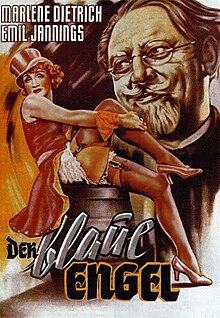| The Blue Angel | |
|---|---|
 Theatrical release poster | |
| German | Der blaue Engel |
| Directed by | Josef von Sternberg |
| Written by |
|
| Based on | Professor Unrat by Heinrich Mann |
| Produced by | Erich Pommer |
| Starring | |
| Cinematography | Günther Rittau |
| Edited by |
|
| Music by |
|
| Distributed by | Universum Film A.G. |
Release date |
|
Running time | 108 minutes |
| Country | Germany |
| Languages |
|
| Box office | $77,982 (2001 re-release)[1] |
The Blue Angel (German: Der blaue Engel) is a 1930 German musical comedy-drama film directed by Josef von Sternberg and starring Marlene Dietrich, Emil Jannings and Kurt Gerron. Written by Carl Zuckmayer, Karl Vollmöller and Robert Liebmann, with uncredited contributions by Sternberg, it is based on Heinrich Mann's 1905 novel Professor Unrat (Professor Filth) and set in an unspecified northern German port city.[2] The Blue Angel presents the tragic transformation of a respectable professor into a cabaret clown and his descent into madness. The film was the first feature-length German sound film and brought Dietrich international fame.[3] It also introduced her signature song, Friedrich Hollaender and Robert Liebmann's "Falling in Love Again (Can't Help It)". The film is considered a classic of German cinema.
The film was shot simultaneously in German- and English-language versions. Though the English version was once considered a lost film, a print was discovered in a German film archive, restored and screened at San Francisco's Berlin and Beyond film festival on January 19, 2009.[4] The German version is considered to be "obviously superior";[5] it is longer and not marred by actors struggling with English pronunciation.[6]
- ^ a b The Blue Angel (1930) at IMDb[better source needed]
- ^ Reimer & Zachau 2005, p. 34.
- ^ Bordwell, David; Thompson, Kristin (2003) [1994]. "The Introduction of Sound". Film History: An Introduction (2nd ed.). New York City: McGraw-Hill. p. 204. ISBN 978-0-07-115141-2.
- ^ Winnert, Derek (3 June 2014). "The Blue Angel [Der blaue Engel] ***** (1930, Marlene Dietrich, Emil Jannings, Kurt Gerron, Rosa Valetti, Hans Albers) – Classic Movie Review 1285". Derek Winnert. Archived from the original on 7 September 2022. Retrieved 19 April 2023.
- ^ Maltin, Leonard, ed. (2005). Leonard Maltin's 2005 Movie Guide. Plume. p. 151. ISBN 978-0-452-28592-7.
- ^ Travers, James (2005). "Der Blaue Engel (1930)". Films de France. Archived from the original on 17 November 2015.